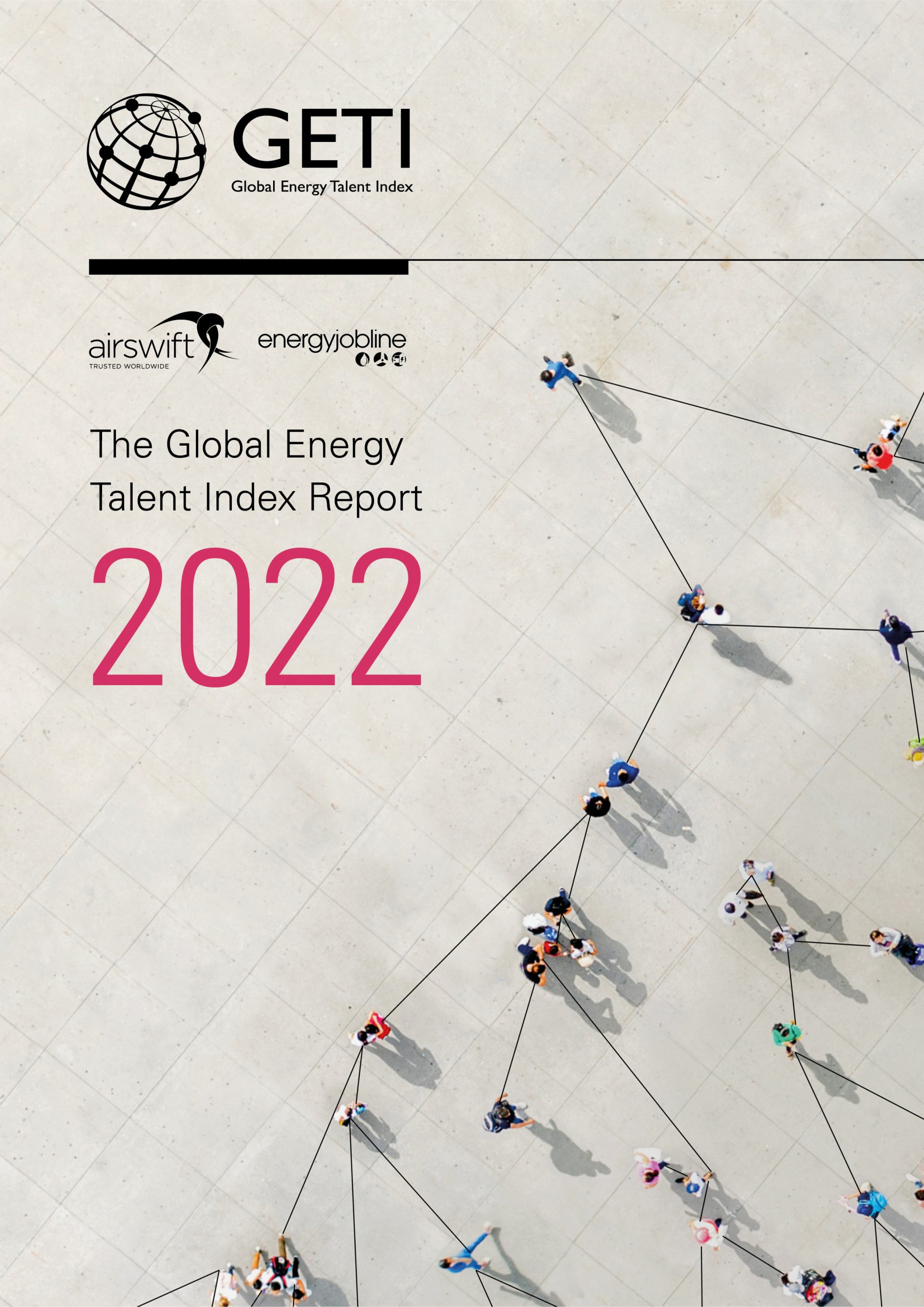Download the 2022 GETI report
March 22, 2022

GETI 22: Three-quarters of energy pros consider career change
- Industry-wide technical skills shortage means all sectors now more likely to seek technical skills outside their company
- Skills gap drives four of five energy sectors to prioritise AI and automation above mentoring or recruitment
- Over 75 per cent of energy professionals considering a career change within three years with oil & gas, power and nuclear professionals favouring switch to renewables
LONDON, UK, 22 March 2022, The sixth annual Global Energy Talent Index (GETI), the world’s most established and comprehensive energy recruitment and employment trends report has revealed the transition to clean energy is accelerating a mass migration of skills from traditional to renewable sectors and a growing technical skills shortage across the energy industry.
The report by Airswift, the global workforce solutions provider for the STEM industries, and Energy Jobline, the world’s leading jobsite for the energy and engineering industries found a major technical skills shortage means recruiters across all energy sectors are more likely to seek technical skills outside their company than in-house. The accelerating transition to clean energy means engineering skills are the most in-demand technical skill across all sectors. The skills shortfall is tilting the balance of power towards professionals with salaries rising across all sectors.
The skills shortfall is also seeing many companies turn to automation over recruitment or talent development. Four energy sectors – power, petrochemicals, oil and gas and renewables – are now more likely to adapt their skills to a changing energy landscape through AI and automation than through mentoring existing employees or recruiting from outside.
Evidence also indicates the transition to clean energy is being accompanied by an exodus of skills from traditional to renewable energy which could exacerbate skills shortages in some sectors. Over three-quarters of professionals in traditional energy sectors would consider switching to another sector within three years and most potential career-changers in oil and gas, power and nuclear would move to renewables.
This is partly influenced by concerns over climate change with over 80 per cent of professionals across all sectors saying that ESG concerns are now a factor in whether to join or leave an energy firm. Yet many renewable workers also moved to traditional sectors such as oil and gas in the last 18 months and half of professionals in fossil fuel sectors say their organization’s ESG policies are sufficiently robust. This indicates that recent decarbonization efforts are helping boost employee retention and recruitment across traditional energy sectors.
Accelerating digitalization to drive decarbonization is also creating an acute shortage of digital skills, with the power, petrochemical and renewable sectors equally, or more likely, to seek digital skills outside the industry than within other energy sectors. Spiraling demand for digital skills is demonstrated by the fact that 30 per cent across all sectors list new digitally-enabled skills and competencies as the biggest opportunity for their sector over the next three years.
Janette Marx, Chief Executive Officer at Airswift, says: “Growing industry convergence around clean energy has created more porous borders between sectors and renewables is increasingly attractive because of its sustainable mission and long-term career prospects. Instead of fighting for a limited pool of existing talent, the industry should expand the talent net to sectors such as technology where there are growing skills overlaps.”
“The skills shortage has made this a dream market for employees with a strong salary bounce across all sectors and a growing willingness among energy firms to hire from other sectors. An engineer on an offshore oil rig has many of the raw skills needed for an offshore wind-to-hydrogen project. That said, some firms will simply look to fill skills gaps by automating more jobs and we are already seeing automation increasing.”
Airswift and Energy Jobline surveyed 10,000 energy professionals and hiring managers in 166 countries across five industry sub-sectors: oil and gas, renewables, power, nuclear and petrochemicals. The report is available to download at http://www.getireport.com.

0 Comments
Leave a comment
Your email address will not be published.